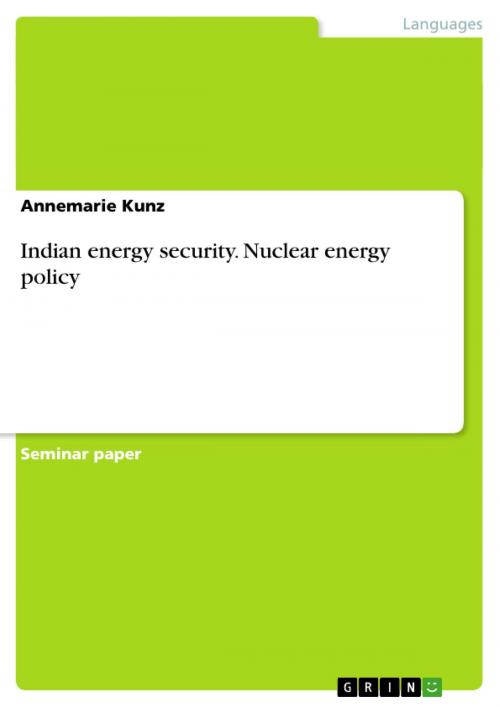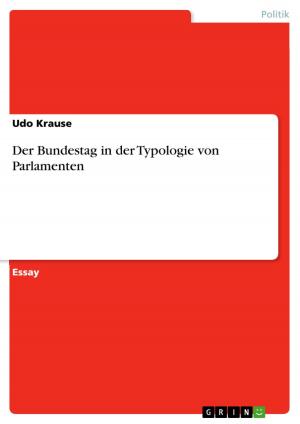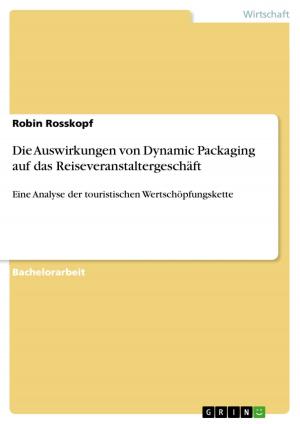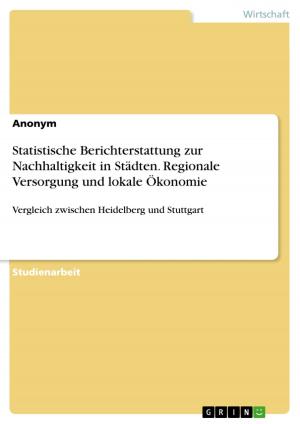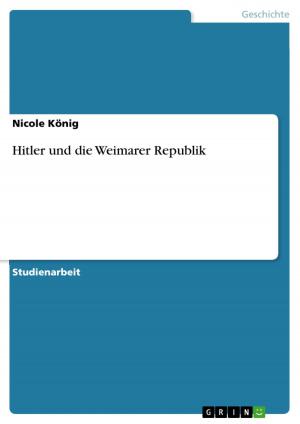Indian energy security. Nuclear energy policy
Nonfiction, Social & Cultural Studies, Social Science, Cultural Studies, Ethnic Studies| Author: | Annemarie Kunz | ISBN: | 9783656630524 |
| Publisher: | GRIN Verlag | Publication: | April 4, 2014 |
| Imprint: | GRIN Verlag | Language: | English |
| Author: | Annemarie Kunz |
| ISBN: | 9783656630524 |
| Publisher: | GRIN Verlag |
| Publication: | April 4, 2014 |
| Imprint: | GRIN Verlag |
| Language: | English |
Seminar paper from the year 2012 in the subject South Asian Studies, South-Eastern Asian Studies, grade: 1,0, Charles University in Prague, language: English, abstract: Energy is the key to a state's economic growth: it influences not only sustainable development, but also areas such as education and health. India is one of the world's fasted growing economies and, consequently, energy markets. It is confronted with the challenge of closing the vast gap between energy demand and supply and additionally considering climate change. Currently, India's energy mix is dominated by fossil fuels such as oil and coal, which has to be imported and makes the country dependent on global price fluctuations. Nuclear power is an energy resource that could increase India's energy security and fulfil the needs of guaranteeing both economic growth and environmental sustainability for India. This paper analyses India's Nuclear Energy Policy, its three stage nuclear plan and its historical development. Due to lacking civil nuclear cooperation with other countries and few uranium reserves of bad quality, India was not able to develop and unfold its nuclear program over the last decades. An important step towards a larger share of nuclear power has been the Indo-US nuclear deal, which the Indian government appreciates very much, as it opened up trade options for technology and fuel for India. Morever, this paper focuses on legal issues concerning nuclear energy, its advantages and disadvanteges and will also give critique on the implementation and integration of the policy. It will conclude that nuclear energy has a lot of obstacles, but is an important alternative option for India to become independent from fossil fuels.
Seminar paper from the year 2012 in the subject South Asian Studies, South-Eastern Asian Studies, grade: 1,0, Charles University in Prague, language: English, abstract: Energy is the key to a state's economic growth: it influences not only sustainable development, but also areas such as education and health. India is one of the world's fasted growing economies and, consequently, energy markets. It is confronted with the challenge of closing the vast gap between energy demand and supply and additionally considering climate change. Currently, India's energy mix is dominated by fossil fuels such as oil and coal, which has to be imported and makes the country dependent on global price fluctuations. Nuclear power is an energy resource that could increase India's energy security and fulfil the needs of guaranteeing both economic growth and environmental sustainability for India. This paper analyses India's Nuclear Energy Policy, its three stage nuclear plan and its historical development. Due to lacking civil nuclear cooperation with other countries and few uranium reserves of bad quality, India was not able to develop and unfold its nuclear program over the last decades. An important step towards a larger share of nuclear power has been the Indo-US nuclear deal, which the Indian government appreciates very much, as it opened up trade options for technology and fuel for India. Morever, this paper focuses on legal issues concerning nuclear energy, its advantages and disadvanteges and will also give critique on the implementation and integration of the policy. It will conclude that nuclear energy has a lot of obstacles, but is an important alternative option for India to become independent from fossil fuels.
